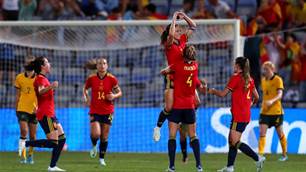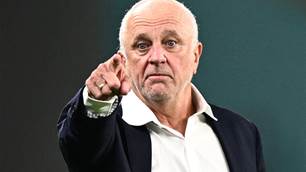NEW Zealand skipper Ryan Nelsen sees unfolding similarities between the Socceroos of 2006 and the current All Whites squad as the countries prepare to do battle in Melbourne tonight.
To see the Kiwis train for tonight's match...
Nelsen sees plenty of similarities between the Australian team of 2006, which made the second round, and New Zealand in 2010. He believes a strong showing in South Africa could prove a watershed moment for the recognition of the sport in New Zealand.
"I see a very strong correlation to the Australian team in 2006. All of a sudden, they qualified to Germany and next thing you know it's like this. I've sat in press conferences when I've played against Australia and there's four of you there. Now look at you, it's packed and it's the same thing that's happened in New Zealand," he said.
"Even that game against Uruguay, it was one of the greatest sporting moments in Australian history, it's the exact same for us, what we did against Bahrain. Everybody saying the same thing. It's given some major, major publicity and media behind the team and it's fantastic."
The correlations between Nelsen, an eloquent and passionate leader and current Socceroos captain Lucas Neill are also strong. The former Blackburn team-mates have spent a long period as established players in Europe and see the World Cup as an excellent opportunity to write their name into history, not just for their countries, but on a global level.
Nelsen has the utmost respect for the Socceroos line-up, but believes that in the coming years, the All Whites will be an even more formidable opponent for Australia given the talent which is emerging, including Chris Wood and Winston Reid.
"The great thing about it is that in four years' time, this team will be stronger. All our players. We've got one player [Wood] who has already got Premier League experience and he is 18. We've got one guy [Reid] who most of the Italian clubs are looking at him, playing in Denmark. At the moment, he's on our bench," Nelsen said.
"In three years' time if you look at the Australian team and the New Zealand team, they will be two very different stories."
Coach Ricki Herbert may be hailing New Zealand's appearance at the World Cup as a high point in the sport's history in the Shaky Isles, but he believes it would be a giant opportunity missed if the All Whites failed to be competitive in South Africa.
Herbert, who played in the 1982 World Cup for New Zealand, the nation's only previous appearance at the tournament, said the reaction from the New Zealand public had been extraordinary and for the first time, football was the No.1 code in the country.
"If you'd been there since November, it's not third- or fourth-ranked, it's No.1 at the moment, and probably quite high on that ranking. It's just been incredible," he said. "It's been staggering. 1982 I thought was a fantastic time, but this has been incredibly successful."
The public is behind the All Whites in record numbers and Herbert said there wouldn't be a stadium big enough if Monday's match had been played in NZ. But Herbert witnessed first-hand how the game fell quickly from the public radar in 1982 after his team lost all three games in Spain and he doesn't want a similar situation this time around.
"I think the pressure is always going to be on. It's to be expected, that's the industry and quite rightly so. We want to make a difference, we want to go there and do well. The public have been incredibly supportive. 28 years is a long time in the wilderness, not to be back on that stage," he said.
"I think you can only applaud the players with what they've done and what they've done for a nation to bring football back to where it should be."
"At the end of the day, they've still got a job to do and they are all very aware of that. While a lot will think that it's a great achievement to get there, I think internally as group we want to take it a little bit further that."
Related Articles

Matildas 'have parked' 7-0 thrashing: 'We're one of the best pressing teams in the world'

Socceroos coach says Argentina can only 'play two ways'













